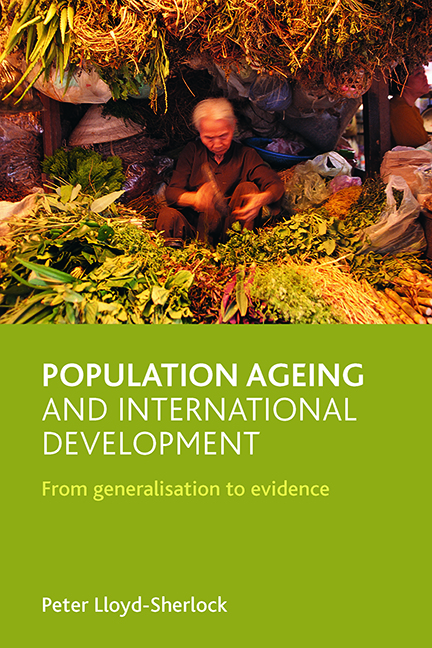Book contents
- Frontmatter
- Contents
- List of abbreviations
- Acknowledgements
- Notes on the author
- Introduction
- one International development and population ageing
- two Experiencing later life in contexts of development
- three Older people, pensions and development
- four Population ageing and health
- five Later life and social relations: family, migration and care
- six Ageing and development in South Africa
- seven Ageing and development in Argentina
- eight Ageing and development in India
- nine Conclusions and overview
- References
five - Later life and social relations: family, migration and care
Published online by Cambridge University Press: 15 July 2022
- Frontmatter
- Contents
- List of abbreviations
- Acknowledgements
- Notes on the author
- Introduction
- one International development and population ageing
- two Experiencing later life in contexts of development
- three Older people, pensions and development
- four Population ageing and health
- five Later life and social relations: family, migration and care
- six Ageing and development in South Africa
- seven Ageing and development in Argentina
- eight Ageing and development in India
- nine Conclusions and overview
- References
Summary
Introduction
Informal networks and social relations are central to the wellbeing of all age groups, but are particularly important for older people and young children. As societies undergo modernisation and development, the nature of these social relations will shift, sometimes abruptly. These changes have profound consequences for the lives of individuals and they also feed back into wider development. For example, China's dramatic fertility decline since the 1980s has reshaped families and this will have complex and substantial impacts on that country's future. Chapter Two introduced the idea that modernisation is usually harmful to older people since, among other things, it reduces their social contacts and promotes their isolation. In fact, it is very dangerous to make such generalised claims, since processes of modernisation are very diverse and older people face widely differing circumstances. This chapter explores these issues in more detail. It begins by examining trends in family structures and patterns of living arrangements, and then considers their implications for older people. These developments are located within a wider setting of social change, including an analysis of the effects of migration on older people. The chapter closes with a discussion of the provision of long-term care, including institutional care homes.
Throughout the chapter, particular attention is paid to gender issues. Gender dynamics play a major part in shaping social relations and underpin the functioning of households and other informal institutions. In almost all societies, the majority of caregiving is provided by women, either on an informal basis (looking after relatives) or as salaried workers (in care institutions, hospitals or as hired home carers). Consequently, where development leads to changes in women's social and economic roles, this may have important effects on older people. Personal experiences of later life are highly gendered in a number of other important ways. For example, in some countries, women's limited lifetime access to paid work and restricted pension entitlements mean that they are especially dependent on the support provided by children and other family members when they reach old age. More often than not, older women outlive their spouses, which may leave them vulnerable to social isolation.
- Type
- Chapter
- Information
- Population Ageing and International DevelopmentFrom Generalisation to Evidence, pp. 117 - 142Publisher: Bristol University PressPrint publication year: 2010



